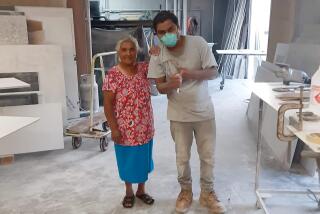Judge Dismisses 60 Rocketdyne Lawsuits
- Share via
SIMI VALLEY — A federal judge on Monday dismissed lawsuits filed by 60 plaintiffs alleging that rocket testing and research at Rocketdyne facilities caused them to develop cancer and related illnesses.
U.S. District Judge Audrey B. Collins also hinted that she would consider decertifying a class-action suit against Boeing North American, Rocketdyne’s parent company. Based on her review of some cases, she said the claims may be substantially different from each other.
“The individual differences came to bear upon me,” she said, suggesting that the defendants file a motion to decertify the class of plaintiffs.
The lawsuit claims that dangerous chemicals and radionuclides migrated from four Rocketdyne facilities in the Simi and San Fernando valleys--including the Santa Susana Field Laboratory--and contaminated surrounding soil, air and water.
Thousands of people in Ventura County and the San Fernando Valley are seeking unspecified damages through the class-action suit for alleged contamination of their properties as well as medical monitoring of any related health risks.
Nearly 300 individual plaintiffs with cancer and other serious illnesses who have been joined to the class-action suit claim that their conditions were caused by the alleged chemical seepage.
On Monday, Collins ruled that 60 of those individuals should have known that their illnesses, which were diagnosed before 1997, may have been caused by testing and research at the facilities, and should have filed their claims prior to the class-action lawsuit, which was filed in 1998.
J. Paul Gignac, a lawyer for the ill plaintiffs, said the judge reasoned that media coverage of the facilities, including a UCLA study on Rocketdyne workers, should have prompted them to file suit earlier. The study found that some workers have a greater-than-expected cancer death rate.
“Based on the massive publicity, everyone actually affected should have been put on notice,” said Gary Black chief in-house counsel for Boeing.
The judge is still reviewing the claims of the other ill plaintiffs, Gignac said.
The judge said that as she reviewed the 60 claims, she concluded that a class-action lawsuit for the property-related claims may not be appropriate, and suggested that Boeing consider filing a motion to decertify the class.
The judge had certified the class in 1998. A class action is often used in cases with a large number of plaintiffs. However, to be certified, the class members’ claims must be based on the same facts.
Black said the company would probably follow the judge’s suggestion. A. Barry Cappello, an attorney for the plaintiffs, said he was not disheartened by Collins’ ruling.
“This was not a fatal blow,” he said. “The class action is still alive . . . but she’s clearly having some second thoughts about it.”
More to Read
Inside the business of entertainment
The Wide Shot brings you news, analysis and insights on everything from streaming wars to production — and what it all means for the future.
You may occasionally receive promotional content from the Los Angeles Times.











